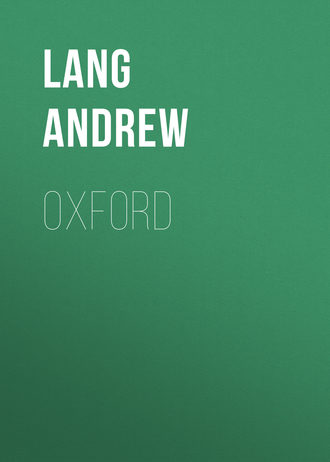
Lang Andrew
Oxford
If St. John’s men have lived in the University too much as if it were a large country-house, if they have imitated rather the Toryism than the learning of their great Archbishop, the blame is partly Laud’s. How much harm to study he and Waynflete have unwittingly done, and how much they have added to the romance of Oxford! It is easy to understand that men find it a weary task to read in sight of the beauty of the groves of Magdalen and of St. John’s. When Kubla Khan ‘a stately pleasure-dome decreed,’ he did not mean to settle students there, and to ask them for metaphysical essays, and for Greek and Latin prose compositions. Kubla Khan would have found a palace to his desire in the gardens of Laud, or where Cherwell, ‘meandering with a mazy motion,’ stirs the green weeds, and flashes from the mill-wheel, and flows to the Isis through meadows white and purple with fritillaries.
‘And here are gardens bright with sinuous rills,
Where blossoms many an incense-bearing tree’;
but here is scarcely the proper training-ground of first-class men!
Oxford returned to her ancient uses in 1625. Soon after the accession of Charles I. the plague broke out in London, and Oxford entertained the Parliament, as six hundred years before she had received the Witan. There seemed something ominous in all that Charles did in his earlier years – the air, or men’s minds, was full of the presage of fate. It was observed that the House of Commons met in the Divinity School, and that the place seemed to have infected them with theological passion. After 1625 there was never a Parliament but had its committee to discuss religion, and to stray into the devious places of divinity. The plague pursued Charles to Oxford. In those days, and long afterwards, it was a common complaint that the citizens built rows of poor cottages within the walls, and that these cottages were crowded by dirty and indigent people. Plague was bred almost yearly at Oxford, and Charles really seems to have improved the sanitary arrangements of the city.
Laud, the President of St. John’s, became, by some intrigue, Chancellor of the University. He made Oxford many presents of Greek, Chinese, Hebrew, Latin, and Arabic MSS. There may have been – let us hope there were – quiet bookworms who enjoyed these gifts, while the town and University were bubbling over with religious feuds. People grumbled that ‘Popish darts were whet afresh on a Dutch grindstone.’ A series of anti-Romish and anti-Royal sermons and pamphlets, followed as a rule by a series of recantations, kept men’s minds in a ferment. The good that Laud did by his gifts – and he was a munificent patron of learning – he destroyed by his dogmatism. Scholars could not decipher Greek texts while they were torturing biblical ones into arguments for and against the opinions of the Chancellor. What is the true story about the gorgeous vestments which were found in a box in the house of the President of St. John’s, and which are now preserved in the library of that college? Did they belong to the last of the old Catholic presidents of what was Chichele’s College of St. Bernard before the Reformation? Were they, on the other hand, the property of Laud himself? It has been said that Laud would not have known how to wear them. Fancy sees him treasuring that bright ecclesiastical raiment, πέπλοι παμποίκιλοι, in some place of security. At night, perhaps, when candles were lit and curtains drawn, and he was alone, he may have arrayed himself in the gorgeous chasuble before the mirror, as Hetty wore her surreptitious finery. ‘There is a great deal of human nature in man.’ If Laud really strutted in solitude, draped rather at random in these vestments, the ecclesiastical gear is even more interesting than the thin ivory-headed staff which supported him on his way to the scaffold; more curious than the diary in which he recorded the events of night and day, of dreaming hours and waking. In the library at St. John’s they show his bust – a tarnished, gilded work of art. He has a neat little cocked-up moustache, not like a prelate’s; the face is that of a Bismarck without strength of character.
In speaking of Oxford before the civil war, let us not forget that true students and peaceable men found a welcome retreat beyond the din of theological fictions. Lord Falkland’s house was within ten miles of the town. ‘In this time,’ says Clarendon, in his immortal panegyric, ‘in this time he contracted familiarity and friendship with the most polished men of the University, who found such an immenseness of wit and such a solidity of judgment in him, so infinite a fancy, bound in by a most logical ratiocination, such a vast knowledge that he was not ignorant in anything, yet such an excessive humility as if he had known nothing, that they frequently resorted and dwelt with him, as in a college situated in a purer air; so that his house was a university in a less volume, whither they came not so much for repose as study; and to examine and refine those grosser propositions, which laziness and consent made current in vulgar conversation.’
The signs of the times grew darker. In 1636 the King and Queen visited Oxford, ‘with no applause.’ In 1640 Laud sent the University his last present of manuscripts. He was charged with many offences. He had repaired crucifixes; he had allowed the ‘scandalous image’ to be set up in the porch of St. Mary’s; and Alderman Nixon, the Puritan grocer, had seen a man bowing to the scandalous image – so he declared. In 1642 Charles asked for money from the colleges, for the prosecution of the war with the Parliament. The beautiful old college plate began its journey to the melting-pot. On August 9th the scholars armed themselves. There were two bands of musqueteers, one of pikemen, one of halberdiers. In the reign of Henry III. the men had been on the other side. Magdalen bridge was blocked up with heaps of wood. Stones, for the primitive warfare of the time, were transported to the top of Magdalen tower. The stones were never thrown at any foemen. Royalists and Roundheads in turn occupied the place; and while grocer Nixon fled before the Cavaliers, he came back and interceded for All Souls College (which dealt with him for figs and sugar) when the Puritans wished to batter the graven images on the gate. On October 29th the King came, after Edgehill fight, the Court assembled, and Oxford was fortified. The place was made impregnable in those days of feeble artillery. The author of the Gesta Stephani had pointed out, many centuries before, that Oxford, if properly defended, could never be taken, thanks to the network of streams that surrounds her. Though the citizens worked grudgingly and slowly, the trenches were at last completed. The earthworks – a double line – ran in and out of the interlacing streams. A Parliamentary force on Headington Hill seems to have been unable to play on the city with artillery. Barbed arrows were served out to the scholars, who formed a regiment of more than six hundred men. The Queen held her little court in Merton, in the Warden’s lodgings. Clarendon gives rather a humorous account of the discontent of the fine ladies ‘The town was full of lords (besides those of the Council), and of persons of the best quality, with very many ladies, who, when not pleased themselves, kept others from being so.’ Oxford never was so busy and so crowded; letters, society, war, were all confused; there were excursions against Brown at Abingdon, and alarms from Fairfax on Headington Hill. The siege, from May 22nd to June 5th, was almost a farce. The Parliamentary generals ‘fought with perspective glasses.’ Neither Cromwell at Wytham, nor Brown at Wolvercot, pushed matters too hard. When two Puritan regiments advanced on Hinksey, Mr. Smyth blazed away at them from his house. As in Zululand, any building made a respectable fort, when cannon-balls had so little penetrative power, or when artillery was not at the front. Oxford was surrendered, with other places of arms, after Naseby, and – Presbyterians became heads of colleges!
CHAPTER V
SOME SCHOLARS OF THE RESTORATION
In Merton Chapel a little mural tablet bears the crest, the name, and the dates of the birth and death, of Antony Wood. He has been our guide in these sketches of Oxford life, as he must be the guide of the gravest and most exact historians. No one who cares for the past of the University should think without pity and friendliness of this lonely scholar, who in his lifetime was unpitied and unbefriended. We have reached the period in which he lived and died, in the midst of changes of Church and State, and surrounded by more worldly scholars, whose letters remain to testify that, in the reign of the Second Charles, Oxford was modern Oxford. In the epistles of Humphrey Prideaux, student of Christ Church, we recognise the foibles of the modern University, the love of gossip, the internecine criticism, the greatness of little men whom rien ne peut plaire.
Antony Wood was a scholar of a different sort, of a sort that has never been very common in Oxford. He was a perfect dungeon of books; but he wrote as well as read, which has never been a usual practice in his University. Wood was born in 1632, in one of the old houses opposite Merton, perhaps in the curious ancient hall which has been called Beham, Bream, and Bohemiæ Aula, by various corruptions of the original spelling. As a boy, Wood must have seen the siege of Oxford, which he describes not without humour. As a young man, he watched the religious revolution which introduced Presbyterian Heads of Houses, and sent Puritanical captains of horse, like Captain James Wadsworth, to hunt for ‘Papistical reliques’ and ‘massing stuffs’ among the property of the President of C. C. C. and the Dean of Ch. Ch. (1646–1648). In 1650 he saw the Chancellorship of Oliver Cromwell; in 1659 he welcomed the Restoration, and rejoiced that ‘the King had come to his own again.’ The tastes of an antiquary combined, with the natural reaction against Puritanism, to make Antony Wood a High Churchman, and not averse to Rome, while he had sufficient breadth of mind to admire Thomas Hobbes, the patriarch of English learning. But Wood had little room in his heart or mind for any learning save that connected with the University. Oxford, the city, and the colleges, the remains of the old religious art, the customs, the dresses – these things he adored with a loverlike devotion, which was utterly unrewarded. He owed no office to the University, and he was even expelled (1693) for having written sharply against Clarendon. This did not abate his zeal, nor prevent him from passing all his days, and much of his nights, in the study and compilation of University history.
The author of Wood’s biography has left a picture of his sombre and laborious old age. He rose at four o’clock every morning. He scarcely tasted food till supper-time. At the hour of the college dinner he visited the booksellers’ shops, where he was sure not to be disturbed by the gossip of dons, young and old. After supper he would smoke his pipe and drink his pot of ale in a tavern. It was while he took this modest refreshment, before old age came upon him, that Antony once fell in, and fell out, with Dick Peers. This Dick was one of the men employed by Dr. Fell, the Dean of Ch. Ch., to translate Wood’s History and Antiquities of the University of Oxford into Latin. The translation gave rise to a number of literary quarrels. As Dean of Ch. Ch., Dr. Fell yielded to the besetting sin of deans, and fancied himself the absolute master of the University, if not something superior to mortal kind. An autocrat of this sort had no scruples about changing Wood’s copy whenever he differed from Wood in political or religious opinion. Now Antony, as we said, had eyes to discern the greatness of Hobbes, whom the Dean considered no better than a Deist or an Atheist. The Dean therefore calmly altered all that Wood had written of the Philosopher of Malmesbury, and so maligned Hobbes that the old man, meeting the King in Pall Mall, begged leave to reply in his own defence. Charles allowed the dispute to go on, and Hobbes hit Fell rather hard. The Dean retorted with the famous expression about irritabile illud et vanissimum Malmesburiense animal. This controversy amused Oxford, but bred bad feeling between Antony Wood and Dick Peers, the translator of his work, and the tool of the Dean of Ch. Ch. Prideaux (Letters to John Ellis; Camden Society, 1875) describes the battles in city taverns between author and translator:
‘I suppose that you have heard of the continuall feuds, and often battles, between the author and the translator; they had a skirmish at Sol Hardeing [keeper of a tavern in All Saints’ parish], another at the printeing house [the Sheldonian theatre], and several other places.’
From the record of these combats, we learn that the recluse Antony was a man of his hands:
‘As Peers always cometh off with a bloody nose or a black eye, he was a long time afraid to goe annywhere where he might chance to meet his too powerful adversary, for fear of another drubbing, till he was pro-proctor, and now Woods (sic) is as much afraid to meet him, least he should exercise his authority upon him. And although he be a good bowzeing blad, yet it hath been observed that never since his adversary hath been in office hath he dared to be out after nine, least he should meet him and exact the rigor of the statute upon him.’
The statute required all scholars to be in their rooms before Tom had ceased ringing. It was, perhaps, too rash to say that the Oxford of the Restoration was already modern Oxford. The manners of the students were, so to speak, more accentuated. However much the lecturer in Idolology may dislike the method and person of the Reader in the Mandingo language, these two learned men do not box in taverns, nor take off their coats if they meet each other at the Clarendon Press. People are careful not to pitch into each other in that way, though the temper which confounds opponents for their theory of irregular verbs is not at all abated. As Wood grew in years he did not increase in honours. ‘He was a mere scholar,’ and consequently might expect from the greater number of men disrespect. When he was but sixty-four, he looked eighty at least. His dress was not elegant, ‘cleanliness being his chief object.’ He rarely left his rooms, that were papered with MSS., and where every table and chair had its load of books and yellow parchments from the College muniment rooms. When strangers came to Oxford with letters of recommendation, the recluse would leave his study, and gladly lead them about the town, through Logic Lane to Queen’s, which had not then the sublimely classical front, built by Hawksmoor, ‘but suggested by Sir Christopher Wren.’ It is worthy of his genius. Wood died in 1695, ‘forgiving every one.’ He could well afford to do so. In his Athenæ Oxonienses he had written the lives of all his enemies.
Wood, ‘being a mere scholar,’ could, of course, expect nothing but disrespect in a place like Oxford. His younger contemporary, Humphrey Prideaux, was, in the Oxford manner, a man of the world. He was the son of a Cornish squire, was educated at Westminster under Busby (that awful pedagogue, whose birch seems so near a memory), got a studentship at Christ Church in 1668, and took his B.A. degree in 1672. Here it may be observed that men went up quite as late in life then as they do now, for Prideaux was twenty-four years old when he took his degree. Fell was Dean of Christ Church, and was showing laudable zeal in working the University Press. What a pity it is that the University Press of to-day has become a trading concern, a shop for twopenny manuals and penny primers! It is scarcely proper that the University should at once organise examinations and sell the manuals which contain the answers to the questions most likely to be set. To return to Fell; he made Prideaux edit Lucius Florus, and publish the Marmora Oxoniensia, which came out 1676. We must not suppose, however, that Prideaux was an enthusiastic archæologist. He did the Marmora because the Dean commanded it, and because educated people were at that period not uninterested in Greek art. At the present hour one may live a lifetime in Oxford and only learn, by the accident of examining passmen in the Arundel Room, that the University possesses any marbles. In the walls of the Arundel Room (on the ground-floor in the Schools’ quadrangle) these touching remains of Hellas are interred. There are the funereal stelæ, with their quiet expression of sorrow, of hope, of resignation. The young man, on his tombstone, is represented in the act of rising and taking the hand of a friend. He is bound on his latest journey.
‘He goeth forth unto the unknown land,
Where wife nor child may follow; thus far tell
The lingering clasp of hand in faithful hand,
And that brief carven legend, Friend, farewell.
O pregnant sign, profound simplicity!
All passionate pain and fierce remonstrating
Being wholly purged, leave this mere memory,
Deep but not harsh, a sad and sacred thing.’ 1
The lady chooses from a coffer a trinket, or a ribbon. It is her last toilette she is making, with no fear and no regret. Again, the long-severed souls are meeting with delight in the home of the just made perfect.
Even in the Schools these scraps of Greek lapidary’s work seem beautiful to us, in their sober and cheerful acceptance of life and death. We hope, in Oxford, that the study of ancient art, as well as of ancient literature, may soon be made possible. These tangible relics of the past bring us very near to the heart and the life of Greece, and waken a kindly enthusiasm in every one who approaches them. In Humphrey Prideaux’s letters there is not a trace of any such feeling. He does his business, but it is hack-work. In this he differs from the modern student, but in his caustic description of the rude and witless society of the place he is modern enough. In his letters to his friend, John Ellis, of the State Paper Office, it is plain that Prideaux wants to get preferment. His taste and his ambition alike made him detest the heavy, beer-drinking doctors, the fast ‘All Souls gentlemen,’ and the fossils of stupidity who are always plentifully imbedded in the soil of University life. Fellowships were then sold, at Magdalen and New, when they were not given by favour. Prideaux grumbles (July 28th, 1674) at the laxness of the Commissioners, who should have exposed this abuse: ‘In town, one of their inquirys is whether any of the scholars weare pantaloons or periwigues, or keep dogs.’ The great dispute about dogs, which raged at a later date in University College, had already begun to disturb dons and undergraduates. The choice language of Oxford contempt was even then extant, and Prideaux, like Grandison in Daniel Deronda, spoke curtly of the people whom he did not like as ‘brutes.’ ‘Pembroke – the fittest colledge in the town for brutes.’ The University did not encourage certain ‘players’ who had paid the place a visit, and the players, in revenge, had gone about the town at night and broken the windows.
When the journey from London to Oxford is so easily performed, it is amusing to read of Prideaux’s miserable adventures, in the diligence, between a lady of easy manners, a ‘pitiful rogue,’ and two undergraduates who ‘sordidly affected debauchery.’
‘This ill company made me very miserable all the way. Only once I could not but heartily laugh to see Fincher be sturdyly belaboured by five or six carmen with whips and prong staves for provoking them with some of his extravagant frolics.’
The ‘violent affection to vice’ in the University, or in the country, was, of course, the reaction against the godliness of Puritan captains of horse. Another form of the reaction is discernible in the revived High Church sentiments of Prideaux, Wood, and most of the students of the time.
The manners of the undergraduates were not much better than those of the pot-house-haunting seniors. Dr. Good, the Master of Balliol, ‘a good old toast,’ had much trouble with his students.
‘There is, over against Balliol College, a dingy, horrid, scandalous ale-house, fit for none but draymen and tinkers, and such as, by going there, have made themselves equally scandalous. Here the Balliol men continually, and by perpetuall bubbing, add art to their natural stupidity, to make themselves perfect sots.’
The envy and jealousy of the inferior colleges, alas! have put about many things, in these latter days, to the discredit of the Balliol men, but not even Humphrey Prideaux would, out of all his stock of epithets, choose ‘sottish’ and ‘stupid.’ In these old times, however, Dr. Good had to call the men together, and —
‘Inform them of the mischiefs of that hellish liquor called ale; but one of them, not so tamely to be preached out of his beloved liquor, made answer that the Vice-Chancelour’s men drank ale at the “Split Crow,” and why should not they too?’
On this, old Dr. Good posted off to the Vice-Chancellor, who, ‘being a lover of old ale’ himself, returned a short answer to the head of Balliol. The old man went back to his college, and informed his fellows, ‘that he was assured there were no hurt in ale, so that now they may be sots by authority.’ Christ Church men were not more sober. David Whitford, who had been the tutor of Shirley the poet, was found lying dead in his bed: ‘he had been going to take a dram for refreshment, but death came between the cup and the lips, and this is the end of Davy.’ Prideaux records, in the same feeling style, that smallpox carried off many of the undergraduates, ‘besides my brother,’ a student at Corpus.
The University Press supplied Prideaux with gossip. They printed ‘a book against Hobs,’ written by Clarendon. Hobbes was the heresiarch of the time, and when an unhappy fellow of Merton hanged himself, the doctrines of Hobbes were said to have prompted him to the deed. To return to the Press. ‘Our Christmas book will be Cornelius Nepos.. Our marbles are now printing.’ Prideaux, as has been said, took no interest in his own work.
‘I coat (quote) a multitude of authors; if people think the better of me for that, I will think the worse of them for their judgement. It beeing soe easyly a thinge to make this specious show, he must be a fool that cannot gain whatsoever repute is to be gotten by it. If people will admire him for this, they may; I shall admire such for nothing else but their good indexs. As long as books have these, on what subject may we not coat as many others as we please, and never have read one of them?’
It is not easy to gather from this confession whether Prideaux had or had not read the books he ‘coated.’ It is certain that Dean Aldrich (and here again we recognise the eternal criticism of modern Oxford) held a poor opinion of Humphrey Prideaux. Aldrich said Prideaux was ‘incorrect,’ ‘muddy-headed,’ ‘he would do little or nothing besides heaping up notes’; ‘as for MSS. he would not trouble himself about any, but rest wholly upon what had been done to his hands by former editors.’ This habit of carping, this trick of collecting notes, this inability to put a work through, this dawdling erudition, this horror of manuscripts, every Oxford man knows them, and feels those temptations which seem to be in the air. Oxford is a discouraging place. College drudgery absorbs the hours of students in proportion to their conscientiousness. They have only the waste odds-and-ends of time for their own labours. They live in an atmosphere of criticism. They collect notes, they wait, they dream; their youth goes by, and the night comes when no man can work. The more praise to the tutors and lecturers who decipher the records of Assyria, or patiently collate the manuscripts of the Iliad, who not only teach what is already known, but add to the stock of knowledge, and advance the boundaries of scholarship and science.
One lesson may be learned from Prideaux’s cynical letters, which is still worth the attention of every young Oxford student who is conscious of ambition, of power, and of real interest in letters. He can best serve his University by coming out of her, by declining college work, and by devoting himself to original study in some less exhausted air, in some less critical society.
Among the aversions of Humphrey Prideaux were the ‘gentlemen of All Souls.’ They certainly showed extraordinary impudence when they secretly employed the University Press to print off copies of Marc Antonio’s engravings after Giulio Romano’s drawings. It chanced that Fell visited the press rather late one evening, and found ‘his press working at such an imployment. The prints and plates he hath seased, and threatened the owners of them with expulsion.’ ‘All Souls,’ adds Prideaux, ‘is a scandalous place.’ Yet All Souls was the college of young Mr. Guise, an Arabic scholar, ‘the greatest miracle in the knowledge of that I ever heard of.’ Guise died of smallpox while still very young.
Thus Prideaux prattles on, about Admiral Van Tromp, ‘a drunken greazy Dutchman,’ whom Speed, of St. John’s, conquered in boozing; of the disputes about races in Port Meadow; of the breaking into the Mermaid Tavern. ‘We Christ Church men bear the blame of it, our ticks, as the noise of the town will have it, amounting to £1,500.’ Thus Christ Church had little cause to throw the first stone at Balliol. Prideaux shows little interest in letters, little in the press, though he lived in palmy days of printing, in the time of the Elzevirs; none at all in the educational work of the place. He sneers at the Puritans, and at the controversy on ‘The Foundations of Hell Torments shaken and removed.’ He admits that Locke ‘is a man of very good converse,’ but is chiefly concerned to spy out the movements of the philosopher, suspected of sedition, and to report them to Ellis in town. About the new buildings, as of the beautiful western gateway, where Great Tom is hung, the work of Wren, Prideaux says little; St. Mary’s was suffering restoration, and ‘the old men,’ including Wood, we may believe, ‘exceedingly exclaim against it.’ That is the way of Oxford, a college is constantly rebuilding amid the protests of the rest of the University. There is no question more common, or less agreeable than this, ‘What are you doing to your tower?’ or ‘What are you doing to your hall, library, or chapel?’ No one ever knows; but we are always doing something, and working men for ever sit, and drink beer, on the venerable roofs.
Long intercourse with Prideaux’s letters, and mournful memories of Oxford new buildings, tempt a writer to imitate Prideaux’s spirit. Let us shut up his book, where he leaves Oxford, in 1686, to become rector of Saham-Toney, in Norfolk, and marry a wife, though, says he, ‘I little thought I should ever come to this.’







